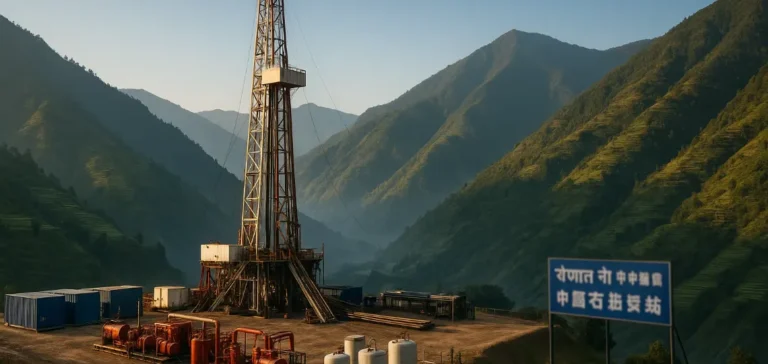The government of Nepal has confirmed the preliminary discovery of a reserve estimated at around 112 billion cubic meters of methane in the Dailekh district, located in the western part of the country. The identification of this potential gas resource follows exploratory drilling carried out in collaboration with the China Geological Survey (CGS). Core samples drilled to a maximum depth of 4,013 meters are currently undergoing detailed analyses, which will confirm the precise characteristics of the discovered gas. The definitive results of these laboratory tests are expected in December 2025, according to Nepal’s Department of Mines and Geology.
Economic and Energy Implications
This discovery comes at a strategic moment, as Nepal seeks to diversify its energy sources in order to reduce its dependency on hydrocarbon imports. According to the Central Bank of Nepal, the country spent approximately $1.5 billion on petroleum product imports over the past ten months, representing nearly 16% of total imports. Developing this domestic reserve could significantly alter Nepal’s trade balance by providing a credible alternative to fossil fuel imports.
Sino-Nepalese Cooperation Context
The exploratory drilling is part of a bilateral agreement between Nepal and China initiated in 2019. The company CNPC Xibu Drilling Engineering, specialized in complex technical operations, has been directly involved in the project. The initial cost of this pilot project is estimated at 2.5 billion Nepalese rupees, funded by the Chinese side. This partnership reflects China’s growing interest in Nepal’s energy resources within a regional context where securing energy supplies remains crucial.
Next Steps and Technical Uncertainties
The final publication of the technical results in December will mark a decisive step towards commercial validation of the project. Additional studies will be necessary to determine the quality of the gas, the precise commercial volumes, and the economic viability of large-scale exploitation. The legal and regulatory framework will also need clarification before industrial production and the structuring of commercial contracts can be considered. The profitability of the project will depend largely on these upcoming technical and regulatory steps.






















